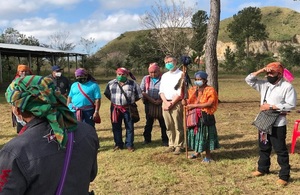World news story
The British Ambassador in Guatemala, Nick Whittingham, met with the Mayan Council of Indigenous Spiritual Leaders of the Southern Peten, ACGERS, who are using the benefits of ancient traditional medicine as part of a UK funded project.

The project called “Green Health” is researching medical use of biodiversity (based on indigenous healthcare practices), to develop mechanisms protecting this knowledge, and consider how to use this to increase the health and prosperity of less favoured groups in Guatemala.
Other partners of the project are the University College London (UCL), Universidad del Valle de Guatemala (UVG) and the National Council of Protected Areas (CONAP). Originally funded with more than 3 million quetzals for three years, the project recently received an extra 500,000 quetzals allocation to fight the impact of COVID-19 and help communities to overcome economic hurdles associated to it.
Additional funding will help the Mayan Council of Elders to acquire the tools to protect many species that are at risk due to habitat loss and degradation. It will also help villagers to obtain additional income by gathering seeds of local species through forest transect walks; planting and nurturing of seeds in a local ethnobotany garden; and documenting traditional medicine used for respiratory syndromes.
This will create effective synergies between urgent income generation and participatory research to understand the role of traditional Q’eqchi’ knowledge in biodiversity use for medicinal as well as food security strategies. Ambassador Whittingham walked along the Mayan spiritual leaders in some of these special biodiversity areas, in Poptun, Peten.
Published 4 February 2021
Follow this news feed: HM Government





